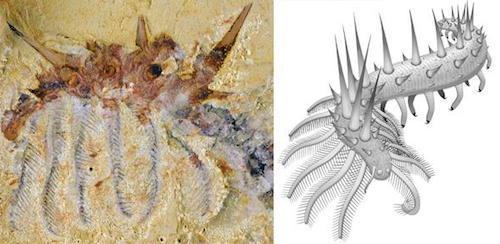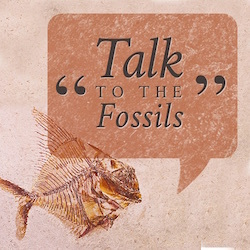Discovery Institute's Blog, page 149
July 2, 2015
Cardiovascular Function: Potassium Control and the Case for Intelligent Design

Editor's note : Physicians have a special place among the thinkers who have elaborated the argument for intelligent design. Perhaps that's because, more than evolutionary biologists, they are familiar with the challenges of maintaining a functioning complex system, the human body. With that in mind, Evolution News & Views is delighted to present this series, "The Designed Body." Dr. Glicksman practices palliative medicine for a hospice organization.

My last article in this series showed that...
In Resolving Darwin's Doubt, New Cambrian Animal Fossils Are No Help at All

More complexity in the earliest multicellular animals intensifies what Discovery Institute's Stephen Meyer calls "Darwin's Doubt."
Euarthropods
A paper in Current Biology comes closest to demonstrating "the deep homology between exoskeletal features in an evolutionary continuum of taxa with distinct types of body organization." Author Javier Ortega-Hernndez takes on "the euarthropod head problem" by finding similarities between two specimens from the Burgess Shale (Middle Cambrian). His anal...
Following Appendectomy, a Higher Incidence of Cancer Suggests an Immune-Function of Appendix

In the past two weeks I've given three talks, and each time during the Q&A afterward, the same question came up from the audience: Does the appendix have a function, or as Darwinian evolutionists prefer, is the organ merely vestigial and therefore useless?
We've covered this issue many times before here on ENV. The answer is that the appendix is indeed functional. But a recent paper from PLOS One, "Association between Appendectomy and Subsequent Colorectal Cancer Development: An Asian Popula...
July 1, 2015
Listen: Concluding Comments by Dr. Wolf-Ekkehard L��nnig on the Law of Recurrent Variation

On an episode of ID the Future, Casey Luskin wraps up his interview with Dr. Wolf-Ekkehard Lnnig, retired geneticist at the Max Planck Institute for Plant Breeding Research in Germany, on the law of recurrent variation and the challenge it poses to Darwinian evolutionary theory.
See here for the first and second parts of Luskin's interview with Dr. Lnnig.
Seattle and San Antonio Premieres of Living Waters: Intelligent Design in the Oceans of the Earth

The series of stunning documentaries from Illustra Media on evidence for design in living creatures culminates with Living Waters: Intelligent Design in the Oceans of the Earth. The film will have its regional premieres this month and next, in San Antonio and Seattle, respectively on July 10 and August 5. Please join us at either!
Following on the heels of Metamorphosis and Flight, the new film takes us into the liquid world of Earth's oceans, revealing the dolphin's internal sonar system, t...
Researcher Almost Admits, then Quickly Retracts, that "Intelligent Design" Is Needed to Explore Origin of Life
Here is a video of a lecture, delivered last year at Case Western University, by University of Akron origin-of-life researcher Nita Sahai. Her subject is "The Origins of Life: From Geochemistry to Biochemistry." She starts by making a comment that I agree with: "One of the most fundamental and profound questions that all human societies have asked from prehistory until now is where did we come from." She then gives a highly competent presentation of various issues in the origin of life, incl...
A New Series: Talk to the Fossils

A while back, I started a series here called "Science Fictions" that I began by asking a simple question: Why is the space alien understood as science but Bigfoot as mythology? The reason I asked is that, still lacking specimens of either entity, decade after decade, answers are likely to be revealing.
 Those answers help us see how "science" is understood, allowing us to interpret claims about the origin of the universe, life, human life, and the human mind.
Those answers help us see how "science" is understood, allowing us to interpret claims about the origin of the universe, life, human life, and the human mind.
In general, naturalism (the idea...
June 30, 2015
Join Us in Las Vegas for the FreedomFest Screening of The Biology of the Second Reich
Held in Las Vegas and billed as the "World's Largest Gathering of Free Minds," this year's FreedomFest will be graced by a screening of the award-winning The Biology of the Second Reich. If you're within range of the Planet Hollywood Resort, join director John West, Center for Science & Culture associate director, and our Discovery Institute colleague George Gilder on Friday, July 10, at 10 AM.
The Biology of the Second Reich documents the role of evolutionary thinking in generating the hor...
Why Doesn't Intelligent Design Identify the Designer?
A friendly scientist contacted me recently with a question about intelligent design and specifically the identity of the designer. He believed that the ID movement has "adopted a policy of carefully avoiding explicit identification of the source of ID as the God of the Bible, or any other specific deity" and that this policy "follows from the cultural state of affairs which tolerates nothing having to do with biblical religion." He was concerned that our approach was simply a legal or politi...
"Plant Intelligence" Is Programmed, Not Intrinsic

Earlier this month, Wesley Smith warned against anthropomorphizing plants and ascribing intelligence -- even personhood -- to flowers and trees. But like responsive robots, plants can have smarts programmed into them. "So sure, investigate how plants interact with their environment," he advises. "But use proper, non-personal language. They are plants." Let's do that, and look at some of the superior programming that makes plants look smart because their design is smart.
Leaf Recycling
Discovery Institute's Blog
- Discovery Institute's profile
- 15 followers




